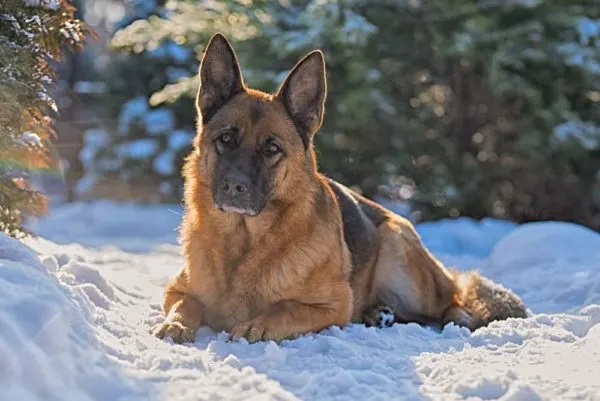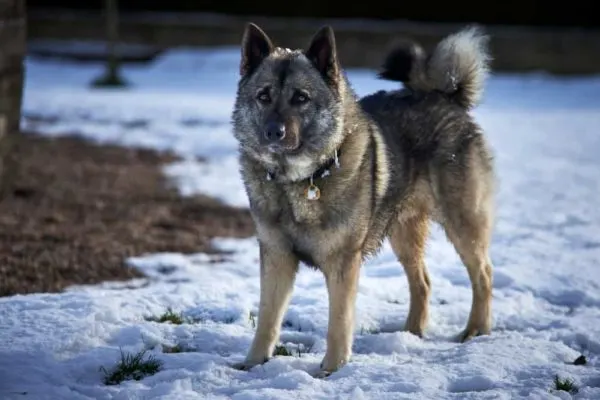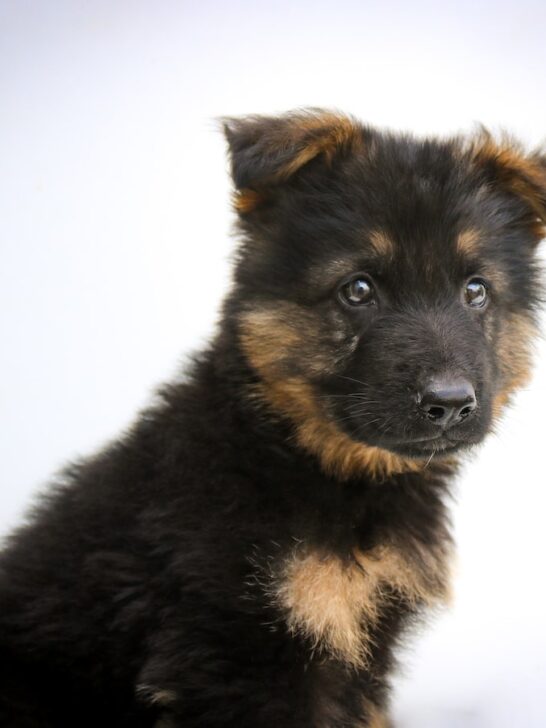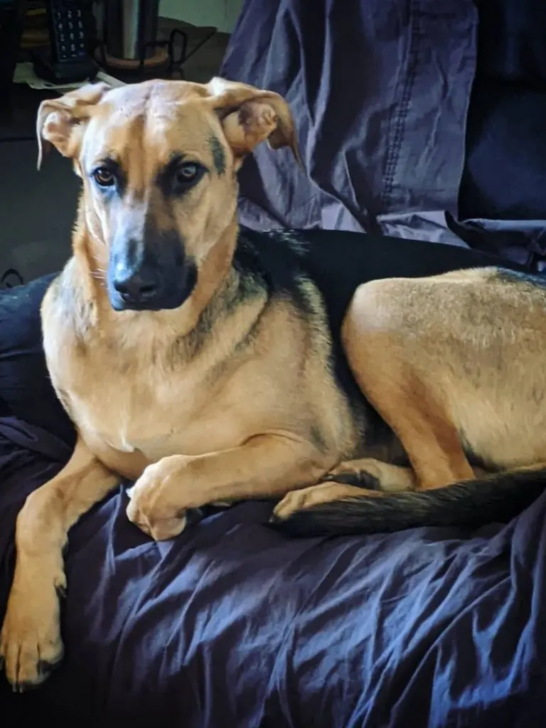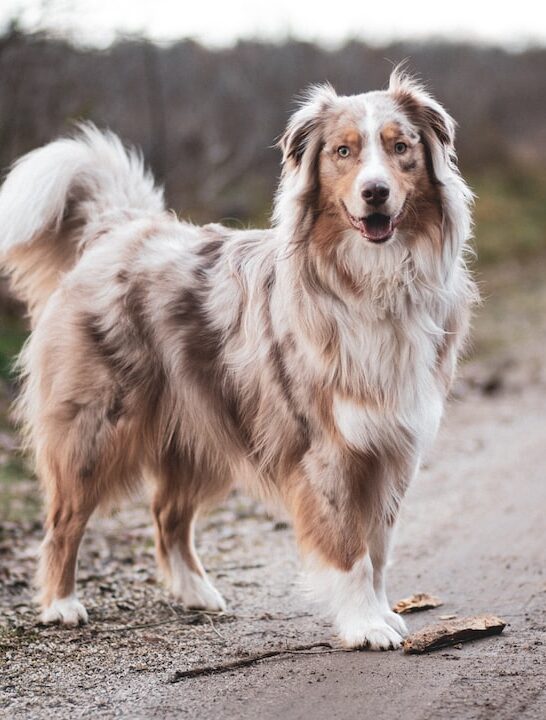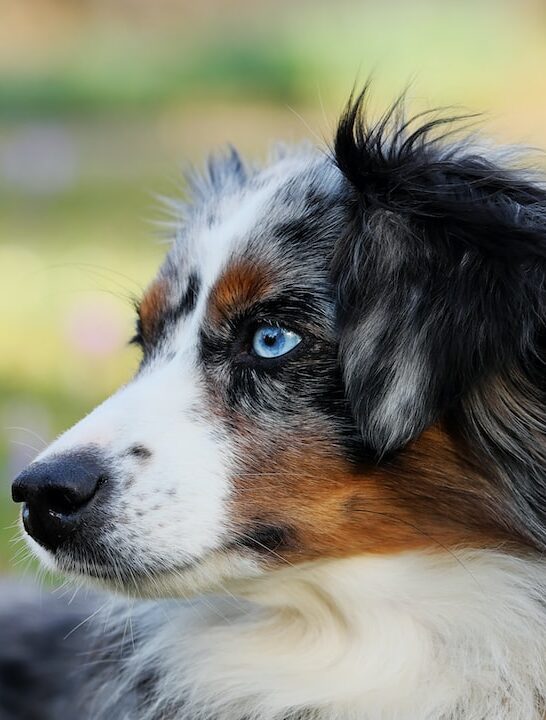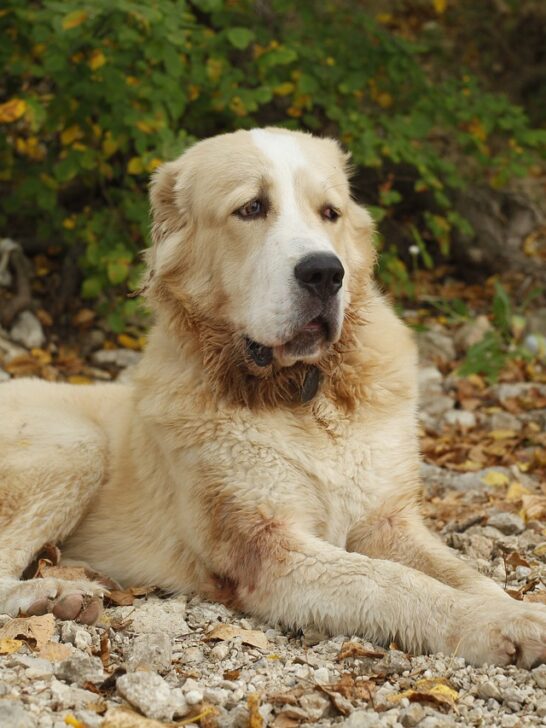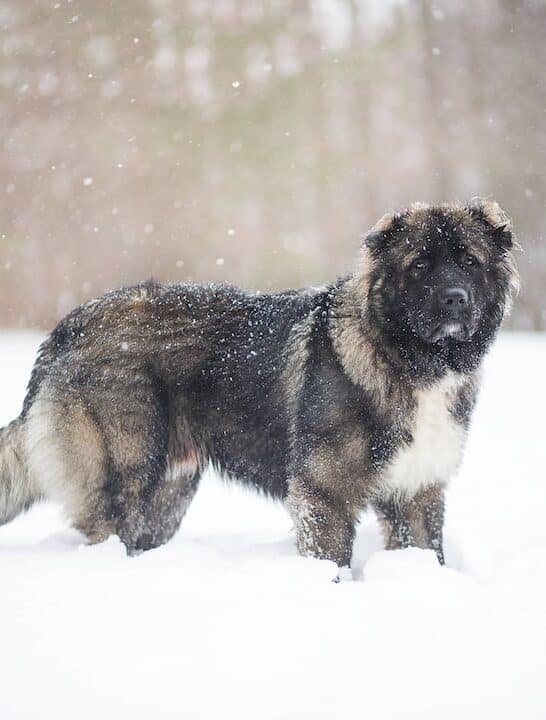Norwegian Elkhound German Shepherd Mix: Meet the Unusual Herding & Hunting Hybrid Dog
The Norwegian Elkhound German Shepherd mix dog is an unusual hybrid dog breed that brings together two parent dogs with surprisingly similar backgrounds yet very different degrees of visibility.
The German Shepherd dog, or GSD, as fans often call them, is a dog that rarely even needs an introduction. These dogs are so well known even people that know little to nothing about dogs can often call them by name on sight.
The Norwegian Elkhound dog, on the other hand, is relatively obscure. Only dog lovers t typically have even heard of this dog breed, let alone can describe any of their best-known traits.
In this article, we take a look at what happens when you crossbreed the beloved German Shepherd dog with the Norwegian Elkhound. What will this hybrid dog be like? Let’s find out.
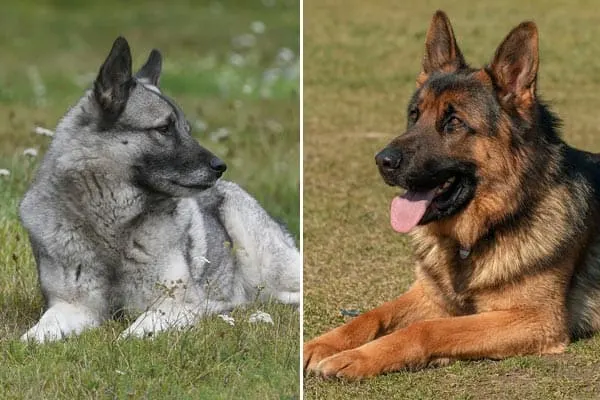
Norwegian Elkhound German Shepherd Mix
As with all hybrid dog breeding projects, it can be challenging to predict in advance what types of traits a puppy might inherit.
However, what we can say for sure is that the Norwegian Elkhound GSD hybrid dog will grow up to have a working dog temperament, a thick double-layer working dog coat, and a very bright, brave, loyal personality.
See a Norwegian Elkhound and a German Shepherd Dog
The Norwegian Elkhound German Shepherd dog you will meet in this owner-made YouTube video really looks a lot more like a German Shepherd but is a hybrid dog.
This is a good example of how unpredictable hybrid dog breeding can be. Some puppies may look much more like one parent dog than another, especially in the earliest (F1, F1b) litters of puppies.
Norwegian Elkhound German Shepherd Mix: Dog Breeds History
One of the best ways to get to know a new hybrid dog breed about which there is not yet a lot of documentation is to learn about the parent dog’s history.
So that is what we will do in this section – learn a bit more about the Norwegian Elkhound dog and the German Shepherd dog parents.
Norwegian Elkhound history
The Norwegian Elkhound actually comes from the hound group of the American Kennel Club (AKC) rather than the herding group.
In terms of their lineage, the Norwegian Elkhound is descended from the truly ancient line of Arctic spitz-type dogs – herding, sledding, hunting, and hauling dogs that often appear fox-like in their facial features and sport a thick working-dog coat.
The breed history states that these dogs are perhaps one of the oldest breeds on the planet with more than six millennia under their belts.
German Shepherd history
The German Shepherd dog actually does hail from Germany, where the breed was originally developed to herd livestock and was later conscripted for military K-9 and police dog work.
As the American Kennel Club (AKC) highlights, the German Shepherd breed survived thanks to one dedicated individual, a German cavalry officer named Captain Max Von Stephanitz.
Captain Von Stephanitz expertly repurposed the breed to keep it from becoming irrelevant when the rise of technology meant livestock herding dogs were no longer in high demand.
Norwegian Elkhound German Shepherd mix history
From this overview, you can discern that your Norwegian Elkhound German Shepherd dog is going to inherit a strong dose of the energetic, active working dog temperament from both parent dogs as well as the thick, double-layer coat.
Norwegian Elkhound German Shepherd Mix Personality & Temperament
Different dog breeds have different personalities and temperaments, and often this is by direct breeder design. In fact, the concept of a companion canine is actually a relatively new idea!
In past decades, a domestic dog always would have a job to do other than simply that of “lap dog” or “family pet.”
It can be important to consider whether a true working dog breed such as the German Shepherd or the Norwegian Elkhound will make a suitable family companion, especially if you have young children or other vulnerable family pets.
In this section, we take a look at how the temperament and personality traits of each parent dog might combine in a hybrid puppy.
Norwegian Elkhound personality and temperament
The purebred Norwegian Elkhound dog is incredibly smart. But when it comes to choosing a pet dog, this is not always a good thing. These dogs are quick learners and get bored very easily.
When a working dog breed is bred to do independent tasks like hunting or herding, they can also be independent-minded, which means these dogs often struggle to grasp the point of common commands like “stay” and “down.”
However, the Norwegian Elkhound has unstoppable bravery and a deep work ethic as befits a dog that was bred to bring down enormous Arctic elk (a moose).
They can do it all – run, swim, jump, herd, hunt – and are well known for standing their ground against predators three or four times their size.
German Shepherd personality and temperament
The famous GSD personality and temperament have been immortalized time and again in famous films like Rin Tin Tin and Strongheart.
German Shepherds are actually extremely people-centric and tend to want to be with their people all day, every day. A lonely or bored German Shepherd is going to be a destructive German Shepherd, unfortunately.
These dogs are known to be vocal and talkative, something first-time GSD owners often have to get used to. They are also incredibly brave and loyal and have a decorated history serving in the military, police force, search and rescue, and many K-9 roles.
Norwegian Elkhound German Shepherd mix personality and temperament
As you can tell, with a Norwegian Elkhound German Shepherd mix dog, you are likely to get an active dog with an independent spirit, a love of running and exploring, and a deep need to be with “their” people, aka you.
It will be important to ask yourself if you can meet your dog’s daily needs for training, exercise, socialization, companionship, and togetherness. This hybrid dog breed will not fare well if expected to be self-entertaining for hours most days.
Norwegian Elkhound German Shepherd Mix: Size, Height, and Weight
One of the big differences between the two parent dogs of the Norwegian Elkhound German Shepherd mix dog is size.
Norwegian Elkhound size, height, and weight
The Norwegian Elkhound typically weighs just 48 to 55 pounds and stands 19.5 to 20.5 inches tall (paw pads to shoulder girdles).
There typically is not much difference in size, height, and weight between females and males.
German Shepherd size, height, and weight
The German Shepherd typically weighs between 50 and 90 pounds and stands 22 to 26 inches tall (paw pads to shoulder girdles).
With the GSD, there can be up to a 15-pound weight difference and a two-inch height difference between adult males and females.
Norwegian Elkhound German Shepherd size, height, and weight
Where you will see the greatest height and weight variance in Norwegian Elkhound German Shepherd puppies is in early (F1, F1b) litters, since the German Shepherd dog can be quite a bit taller and bigger than the Norwegian Elkhound.
If you really need a smaller adult dog, the best way to reduce the risk of having your little puppy grow up to be 90 pounds is to work with a hybrid breeder that specializes in later-generation hybrid breeding (F2, F2b, or later generations).
With later hybrid generation breeding, you will see a lot more consistency in every trait between puppies within a single litter.
Norwegian Elkhound German Shepherd Mix: Training and Exercise Needs
The Norwegian Elkhound German Shepherd mix dog is going to inherit the working dog temperament from both parent dogs. This is actually helpful in terms of planning out how (or if) you can meet your dog’s activity and exercise needs.
Norwegian Elkhound training and exercise needs
The Norwegian Elkhound is a Spitz-type dog breed that is classified as a hound. Hounds are known for their strong ability to follow a trail and to track and hold prey for their human hunting partners.
While this is a fabulous trait if you are out in the woods hunting enormous elk, it is less desirable if you decide to walk a Norwegian Elkhound off-leash in the neighborhood and your dog sees a squirrel or a passing car and decides to “track” it.
These dogs have such an irresistible desire to explore and run and track that they can very easily become lost or come to harm. So while your dog will need plenty of daily exercises and play to stay healthy and happy, don’t walk your dog off-leash.
The independent spirit of the Norwegian Elkhound can also make training and socialization challenges. Yet these dogs need it to learn how to tell the difference between friends, neutral situations, and genuine threats.
German Shepherd training and exercise needs
The German Shepherd dog is also high energy, a high activity dog breed that has an incredible athletic ability. These dogs love to run and jump and play and typically excel at the entire spectrum of canine athletics.
German Shepherds, like Norwegian Elkhounds, need early and ongoing socialization and training and should not be let off-leash in an open area. They need help learning when to welcome a new friend and when to guard or protect against a threat.
Norwegian Elkhound German Shepherd training and exercise needs
Training and exercising a Norwegian Elkhound German Shepherd dog mix will mean devoting at least one hour per day to your dog. This can be a significant time commitment and it is worth considering in advance whether your schedule can accommodate this commitment.
Norwegian Elkhound German Shepherd Mix: Coat Care, Shedding & Grooming
You will notice you won’t have a ton of coat maintenance to deal with in your Norwegian Elkhound German Shepherd dog. But what you will have is a lot of shedding – a LOT.
This means that your Norwegian Elkhound German Shepherd hybrid dog will need a lot of brushing if you don’t want everything you own to end up covered in dog hair during the seasonal coat blows (big sheds).
However, your dog won’t need frequent baths and will be fairly self-maintaining otherwise – kind of a “wash and wear” type of dog.
Norwegian Elkhound German Shepherd Mix: Longevity & Health Issues
When you make a commitment to a new companion canine, you want to make sure you work with a breeder that has done all of the required and recommended genetic health screenings on the parent dogs before allowing them to breed.
Norwegian Elkhound longevity and health issues
According to the Canine Health Information Center (CHIC) database, the Norwegian Elkhound breed has the following known possible genetic health issues you need to be aware of:
- Hip dysplasia.
- Fanconi syndrome.
- Patellar luxation.
- Eye issues.
- Autoimmune thyroiditis.
- Dwarfism.
The Norwegian Elkhound has a typical life expectancy of 12 to 15 years.
German Shepherd longevity and health issues
According to the Canine Health Information Center (CHIC) database, the German Shepherd breed has the following known possible genetic health issues you need to be aware of:
- Hip and elbow dysplasia.
- Eye issues.
- Cardiac issues.
- Temperament issues.
- Degenerative myelopathy.
- Autoimmune thyroiditis.
The German Shepherd has a typical life span of seven to 10 years.
Norwegian Elkhound German Shepherd mix: longevity and health issues
Here, it is easy to see how a crossing of these breeds might result in improved longevity for the puppies.
Frequently Asked Questions
Is a Norwegian elkhound a good family dog?
Yes! A Norwegian Elkhound would make a really good family dog. They are fiercely loyal dogs and very protective. They can often be a little subdued around strangers, but when they have made a bond with a family, they will love you forever.
Do not let their mammoth size put you off, these big softies are reliable and can be incredibly affectionate with humans that they trust.
Of course, getting your Norwegian Elkhound to behave in this way may well require lots of training. Training them can sometimes be a task since their natural instinctual drive is to hunt and be a working dog. With this in mind, getting them to relax can be a task!
You should also note that Norwegian Elkhounds will be able to live more comfortably with older children or no children at all. Small boisterous children could be seen as a threat or may cause stress to the dog.
The same should be said for other pets. Norwegian Elkhounds are independent and should not be kept with other pets, especially smaller dogs and cats as they could view them as prey.
Do Norwegian Elkhounds like to cuddle?
Generally, a Norwegian Elkhound is not known to be a very cuddly breed. As such, you will not usually find them keen to cuddle with you. That being said, this doesn’t mean that your Elkie will never cuddle.
It should be noted that all dogs are different, and whilst breeds have their own specific characteristics, individual dogs have their own personalities and so it may well be the case that your Norwegian Elkhound quite enjoys a cuddle.
As well as this, whilst they may not be a particularly cuddly breed, Norwegian Elkhounds do show affection in their own little ways. Like most dogs, they have a good sense of when their humans are sad, and will naturally want to help.
For example, it is not uncommon for a Norwegian Elkhound to come and lay their head in your lap, or let you stroke them for comfort.
However, this is usually on their terms rather than yours. Remember, you should never force any dog to cuddle against their will! They will let you know when they are ready for that sort of attention.
Do Elkhounds bark a lot?
Yes! It is possible that your Norwegian Elkhound might bark a lot. They are very vocal dogs by nature, and so even if yours is totally tame and you’ve had them since a pup, they are still likely to act on this instinct and bark…a lot.
They are fiercely protective and observant. This means that they use their bark as a sort of alarm, alerting you and others to any new discoveries (usually not dangerous ones, of course, unless the postman is actually a murderer!).
It is possible to get them out of this barking habit through high-quality respect training. However, you will also need to accept to some extent that dogs do bark, and the Elkhound is particularly known for this trait.
Can Norwegian Elkhounds be left alone?
Yes! Norwegian Elkhounds are very independent animals, so you can leave them alone for a few hours.
This means that if you work away from home, you should be able to safely leave them all day, provided they have access to all the essentials they need and plenty of space to explore and exercise.
However, it should be noted that no dog should be left for long periods of time without human interaction. They need access to fresh food, water, and exercise every single day and so you should be there to provide this.
It should also be noted that these dogs should never be left alone with small children or other animals.
Norwegian Elkhound German Shepherd Mix: Is This the Right Dog For You?
It is not something to be taken lightly – making a commitment to a new puppy or rescue dog. For the right owner, the Norwegian Elkhound German Shepherd mix dog can make a remarkable pet.
























